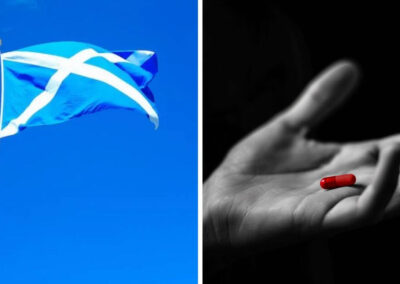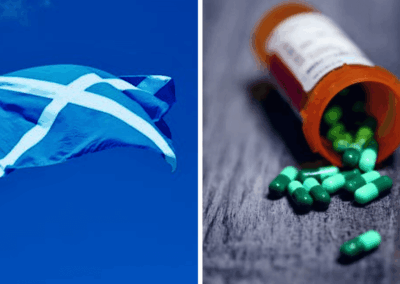An extreme resolution calling for the “right to abortion to be enshrined in the future constitution of an independent Scotland” will be debated and voted on at the 90th Annual National Conference of the Scottish National Party next Sunday.
In the preamble, the resolution (resolution 11) makes specific mention of the overturning of Roe vs Wade which permitted states in the US to decide their own abortion legislation.
Abortion up to birth
The resolution states that access to abortion “should not be subject to the changing tides of political or judicial decisions”, and that “legal abortion is a fundamental aspect of healthcare and bodily autonomy”.
The resolution also states that enshrining abortion in the constitution would safeguard access to abortion “against any potential political or legal regression”.
An absolute right to abortion would mean that abortion would be available on demand, for any reason, up to birth. If this radical change were introduced, Scotland would be left with one of the most extreme abortion regimes in the world.
Constitutions are typically designed to be difficult to amend. In Germany, the constitution, or Basic Law, can only be amended by a two third majority vote across each of the two houses of parliament, the Bundestag and the Bundesrat. In Ireland, a referendum must be held before any changes can be made to the constitution of the country.
Enshrining abortion in a potential future constitution would make it much harder to remove this extreme regime in the future.
If this radical abortion regime were introduced to Scotland, it would be far more radical than the abortion law in England and Wales. It would also likely be harder to revoke because the law in England and Wales can be more easily changed through a majority vote in parliament.
SNP Annual National Conference
According to the SNP’s website “Conference is the ultimate decision-making body of the SNP” and if a resolution is accepted it “becomes SNP policy and can be taken forward in government or championed at Westminster”.
This means that if the extreme abortion resolution being put forward by the Elgin branch of the SNP is accepted, it will become SNP policy and can then be pursued in government.
Any member of the SNP is free to attend conference as a member visitor. However, it is only delegates – members chosen as representatives of branches, constituency associations and affiliated organisations – who are entitled to speak in debates and vote.
It is unclear at this time whether the resolution is likely to pass.
Extreme buffer zone legislation
Despite overwhelming public opposition to the introduction of buffer zones around abortion clinics in Scotland, in June MSPs passed legislation that will make it illegal to offer assistance to women seeking an abortion within 200m of any facility that performs abortions and could even fine people for displaying pro-life signs in their own homes.
The Abortion Services (Safe Access Zones) (Scotland) Bill, introduced by Gillian Mackay MSP, passed Stage 3 with only one MSP – John Mason of the SNP – voting against its introduction. This was despite the fact that 77% of respondents to a consultation on the matter disagreed with the “overall purpose” of the Bill.
Out of the 5,856 responses to the question ‘Do you agree with the overall purpose of this Bill?’, 4,517 (77.13%) disagreed, 1,288 (21.99%) agreed, 40 (0.68%) partially agreed and 11 (0.19%) responded ‘don’t know’. (Full calculations and sources for these figures are available here).
The Bill became an Act on 22 July 2024.
The most extreme abortion buffer zone legislation in the world
The Act introduced the world’s most extreme buffer zone law in Scotland.
It created a minimum of 200m ‘safe access’, or buffer, zones around any facility that performs abortions where offering support to women would be criminalised. The 200m is a minimum, as abortion providers can apply for the zone to be extended, with the Act giving the Scottish Government the power to extend any buffer zone beyond the 200m if they judge that the existing zone “does not adequately protect” women seeking an abortion. There is no limit on the size of the buffer zone that can be created under this power.
The minimum size of the buffer zones introduced by this law extends further than the minimum size of any other buffer zones in the world. For example, the Public Order Act 2023 in England and Wales sets the limits of the buffer zones at 150m and the legislation does not give the Government the power to extend buffer zones beyond 150m. Most buffer zones in Northern Ireland are 100m, half the size of what is being proposed in Scotland.
Within these zones, it is illegal to influence a person in regard to their decision “to access… the provision of abortion” in an abortion clinic or a hospital. These provisions make offers of help to women seeking an abortion illegal within a buffer zone, and appears to criminalise silent prayer.
Anyone who commits an offence can be fined up to £10,000 on a summary conviction, or an unlimited fine on indictment.
The provisions of the law apply to anything “visible or audible” within a buffer zone, even if these relate to private buildings. This means it may be illegal for pro-life signs to be displayed from a window within a private home or outside a place of worship if the signs are within the boundaries of or visible to a buffer zone. Similarly, conversations in private homes or outside churches may be included if they are audible inside a buffer zone. Referring to private dwellings, Mackay herself told the Committee “it is essential that such premises are covered by the legislation”.
Spokesperson for Right To Life UK, Catherine Robinson, said “An absolute right to abortion would mean that abortion would be available on demand, for any reason, up to birth. If this radical change were introduced, Scotland would be left with one of the most extreme abortion regimes in the world”.
“This is a radical and inhumane proposal that would likely lead to the lives of many more babies being lost to abortion in Scotland”.
“If you are an SNP delegate who can speak and vote at the conference, please attend on Sunday 1 September and use your voice to speak out and vote against this radical resolution”.
“If you are an SNP member but not a delegate, and therefore cannot speak or vote on Sunday, please urgently reach out to any delegates you know who can. Encourage them to oppose this resolution”.
“The constitution of a country acts as its foundational document, defining, among other things, the country’s basic principles of government and law. It is deeply disturbing that this SNP resolution proposes to make ending the lives of its unborn citizens one of those foundational principles”.












